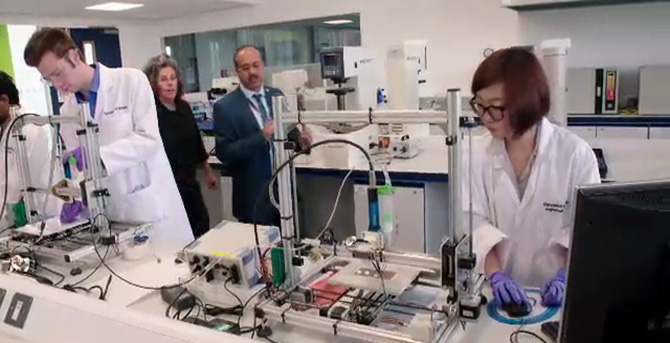8 Nov 2018
Materials at Loughborough Featured in BBC 4 Documentary

Last week, our Advanced Ceramics Research Group featured in a BBC 4 documentary titled “The Secret Story of Stuff: Materials of the Modern Age.” It explores the world of material science, uncovering the innovations in manufacturing that are set to change the world we live in.
The Advanced Ceramics Research Group is headed by Professor Bala Vaidhyanathan at Loughborough University and includes current PhD students Miss Yumeng Chen, Mr William Rowlands, Mr. Avishek Ghosh and Mr. Jason Wu, Research Associates Dr Annapoorani Ketharam, Dr George Chi-Tangyie, Dr. Chang Shu and Dr. Aashu Anshuman.
The group have developed nanostructured ceramics that are totally immune to hydrothermal ageing and has been formulated specifically for dental and hip/knee implants viz., crowns, molars, femoral heads and acetabular cups. The ceramic implants are 3D printed and then microwaved and are found to be much superior to the current commercial benchmark materials.
The item was featured on 31st October 2018, Wednesday evening, but for a short time, you can access the item here: www.bbc.co.uk/materials as well as on BBC iPlayer. Loughborough University feature on dental ceramics starts from 13 minutes, 15 seconds into the programme.
It is great to see that our pioneering research is reorganised through significant public outreach, mainstream media attention and generating global impact in the healthcare sector. Further the general subject area of Materials is also being promoted though such television programmes.
Professor Vaidhyanathan stated:
“It has been a pleasure working in the advanced ceramics group and we hope that the developments on 3D printing of ceramics contributes positively to the advancement of affordable and personalised healthcare solutions across the world. He also thanked the past and present colleagues and collaborators for their contribution”.
The Department of Materials offers their congratulations to Professor Vaidhyanathan and his Research Group on their contribution to this important area of research.
